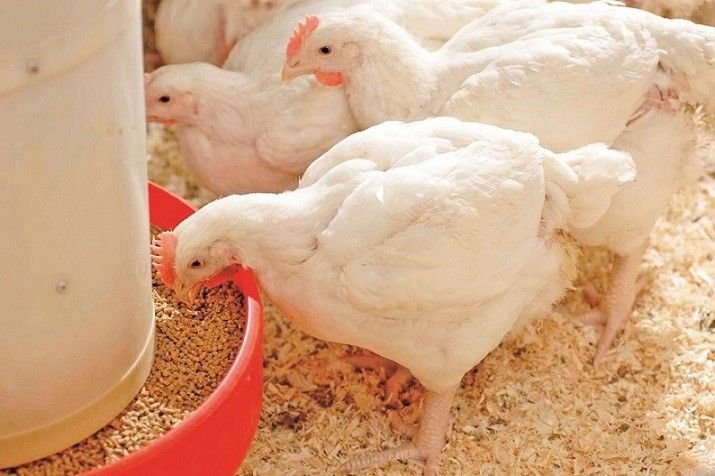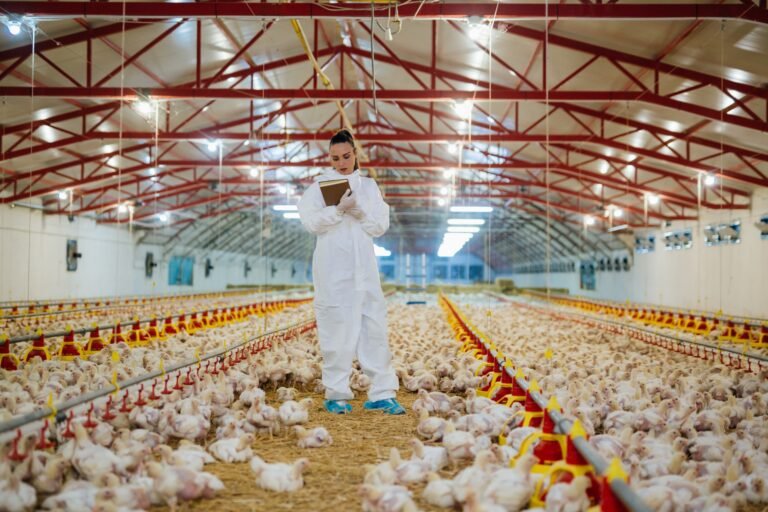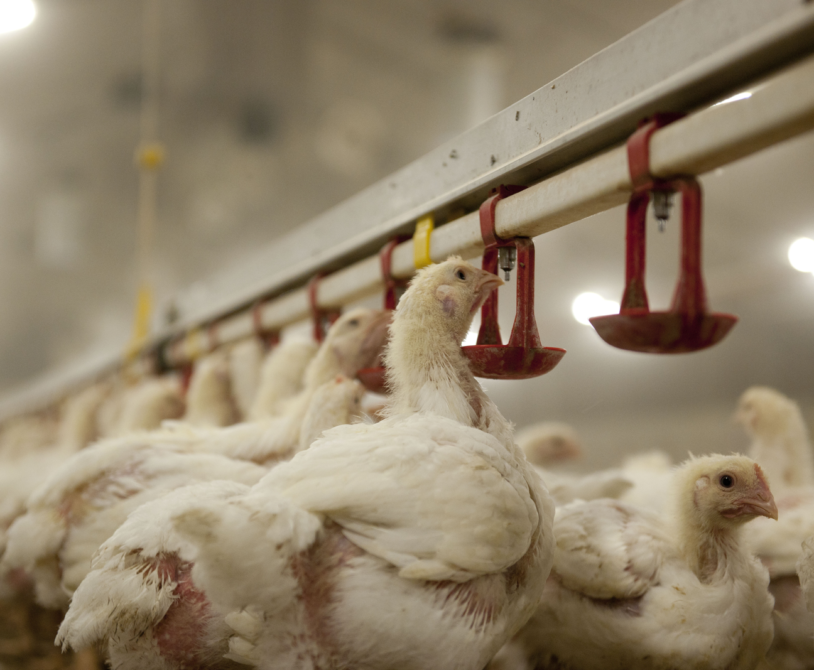Broiler chickens, the meat-producing varieties of poultry, have specific nutritional needs that change as they grow. It’s important to understand these needs to create the best diets for them. From the starter phase to the grower and finisher stages, their body weight and how much they eat change a lot. They need different nutrients at each stage to meet their growing needs.
The nutritional needs of broiler chickens depend on several factors. These include their genetics, the environment they live in, and how they are managed. It’s key to consider these factors when planning their diets. This ensures their diets meet their unique needs at each growth stage.
Key Takeaways
- Broiler chickens have specific nutritional needs that vary across their growth stages, from starter to grower to finisher.
- Understanding the factors that influence feed intake and growth curve is crucial for optimizing broiler nutrition and performance.
- Broiler diets must be formulated with the appropriate nutrient levels, including protein, energy, amino acids, and minerals, to support optimal growth and development.
- Precision feeding strategies, such as phase feeding and feed blending, can help meet the evolving nutritional requirements of broilers at different growth stages.
- Environmental factors and nutrient adjustments play a significant role in ensuring the overall health and productivity of broiler chickens.
Feed Consumption and Body Weight of Broilers
The amount of feed broiler chickens eat and their body weight, are closely related. These factors change a lot based on the bird’s age and sex. [https://www.ncbi.nlm.nih.gov/pmc/articles/PMC9283936/] The Poultry CRC has data on typical feed intake and body weight for broilers at different ages. You can see this information in Table 1.
Factors Influencing Feed Intake
Many things affect how much broilers eat, like the nutrients in their food and their environment. Improving these factors is key to better broiler performance and growth.
Growth Curve and Feed Requirements
Monitoring the growth curve and feed needs of broilers is important. It helps avoid metabolic diseases and ensures they perform well. Using precise feeding methods and phase-feeding can improve feed efficiency and carcass quality.
| Age (days) | Feed Consumption (g/bird) | Body Weight (g/bird) |
|---|---|---|
| 7 | 150 | 200 |
| 14 | 500 | 500 |
| 21 | 1,000 | 1,000 |
| 28 | 1,600 | 1,500 |
| 35 | 2,200 | 2,000 |
| 42 | 2,800 | 2,500 |
“Precision feeding techniques in growing-finishing pigs with daily tailored diets have been shown to impact animal performance, nutrient utilization, and body and carcass composition.”
Nutrient Levels in Broiler Diets
Broiler diets are made to meet the birds’ needs at each growth stage. As they grow from starter to finisher, the diet’s protein, energy, and amino acids change. This ensures they grow well and stay healthy.
Starter, Grower, and Finisher Diets
In the starter phase, diets have more protein and amino acids for fast growth. As birds get older, the nutrient levels in broiler diets decrease. The broiler grower diet and broiler finisher diet have less of these important nutrients.
| Nutrient | Broiler Starter Diet | Broiler Grower Diet | Broiler Finisher Diet |
|---|---|---|---|
| Crude Protein (%) | 22-24% | 20-22% | 18-20% |
| Metabolizable Energy (kcal/kg) | 3,000-3,200 | 3,100-3,300 | 3,200-3,400 |
| Lysine (%) | 1.20-1.30% | 1.10-1.20% | 1.00-1.10% |
| Methionine (%) | 0.50-0.55% | 0.45-0.50% | 0.40-0.45% |
Adjusting nutrient levels in broiler diets as birds grow helps them get the right nutrients. This supports their growth, performance, and health.The Nutritional Needs of Broiler Chickens at Different Growth Stages
Broiler chickens grow in stages, each needing different nutrients. They need a diet rich in energy, carbs, fats, proteins, vitamins, minerals, and water. This diet supports their growth, feed efficiency, and health.
In the starter phase, which lasts four weeks, they need up to 24% protein. This helps their muscles grow fast. As they move to the grower phase, from weeks three to six, the protein drops to about 20%. In the finisher phase, from weeks six to market weight, the protein goes down to 15-17%. Carbs increase to help them gain weight efficiently.
| Growth Stage | Protein Content | Feeding Duration |
|---|---|---|
| Starter | Up to 24% | 0-4 weeks |
| Grower | 18-20% | 3-6 weeks |
| Finisher | 15-17% | 6 weeks to market weight |
Broiler chickens also need clean, fresh water always. Dehydration can hurt their feed intake and performance. Adding fresh greens, fruits, and veggies to their diet boosts vitamins and minerals. This makes them healthier and hungrier.
“Proper heat treatment of soybeans and other legumes is necessary to deactivate trypsin inhibitors that can affect nutrient uptake, highlighting the importance of processing techniques in poultry feed production.”
Knowing the broiler chicken nutritional needs at each stage helps farmers. They can give a balanced diet. This ensures the flock grows well, efficiently, and stays healthy. It makes the farm successful and sustainable.
Amino Acid Requirements
Amino acids are key nutrients for broiler chickens. They need specific amounts of essential and non-essential amino acids. These nutrients help with growth, feather development, and other body functions.
Essential and Non-Essential Amino Acids
Broiler diets must have the right mix of essential amino acids. These include arginine, lysine, methionine, threonine, and valine. The body can’t make these, so they must come from food. Non-essential amino acids like alanine, aspartic acid, and glutamic acid are also crucial for broiler health.
Table 2 shows the amino acid levels needed in broiler diets. These levels help with growth and development.
| Amino Acid | Starter (0-3 weeks) | Grower (3-6 weeks) | Finisher (6-8 weeks) |
|---|---|---|---|
| Arginine | 1.25% | 1.10% | 1.00% |
| Lysine | 1.20% | 1.05% | 0.85% |
| Methionine | 0.50% | 0.38% | 0.32% |
| Threonine | 0.80% | 0.68% | 0.60% |
| Valine | 0.86% | 0.77% | 0.70% |
It’s important to balance essential and non-essential amino acids in broiler diets. This balance is key for growth, feed efficiency, and overall health.
Energy and Protein Levels
Broiler diets need the right mix of broiler energy requirements and broiler protein requirements. This balance is key to growth and development. As broilers move from starter to grower and finisher phases, the diet’s energy and protein levels go down. This is shown in the table below.
| Growth Phase | Metabolizable Energy (kcal/kg) | Crude Protein (%) |
|---|---|---|
| Starter | 2994 | 22.0 |
| Grower | 3040 | 20.0 |
| Finisher | 3081 | 18.5 |
Keeping the energy-to-protein ratio right is vital. It helps ensure feed efficiency and avoids metabolic problems. Research shows that higher dietary energy, like 3040 and 3120 kcal/kg of apparent metabolizable energy (AME), boosts feed conversion in broiler chickens.

The exact energy and protein needs can change. This depends on the broiler strain, environment, and management. It’s crucial to carefully plan and check broiler diets. This ensures the best growth and productivity.
Calcium, Phosphorus, and Sodium Needs
Broiler chickens need specific minerals like calcium, phosphorus, and sodium. These are key to their growth and health. They help with bone health and egg production.
Bone Development and Egg Production
Calcium and phosphorus are vital for broiler chickens’ bones. Studies show that male broilers need 3.19 g/kg to 4.82 g/kg of available phosphorus at different stages. The right calcium-to-phosphorus ratio is important for using these minerals well.
Sodium is also crucial, especially for egg production. Formulating diets with the right amounts of calcium, phosphorus, and sodium is key. It helps with growth, feed efficiency, and egg quality.
| Growth Stage | Calcium (g/kg) | Phosphorus (g/kg) | Sodium (g/kg) |
|---|---|---|---|
| Starter (1-10 days) | 10.0 | 4.8 | 1.8 |
| Grower (11-21 days) | 9.0 | 4.1 | 1.7 |
| Finisher (22-46 days) | 8.5 | 3.6 | 1.6 |
The table shows the recommended levels of broiler calcium requirements, broiler phosphorus requirements, and broiler sodium requirements at different stages. It supports bone development and egg production.
“Proper calcium and phosphorus nutrition is essential for supporting bone development, while sodium plays a crucial role in various physiological processes, including egg production.”
Feed Additives and Supplements
In broiler production, a good diet is key. But certain feed additives and supplements can offer extra benefits. These include better gut health, stronger immune systems, and improved performance. The right types and amounts depend on the farm’s goals, environment, and health challenges.
Probiotics and Prebiotics
Probiotics and prebiotics are seen as good alternatives to antibiotics. Probiotics are live, good bacteria that help the gut. Prebiotics feed these good bacteria, boosting gut health and broiler performance.
Enzymes
Enzymes like phytase, carbohydrases, and proteases help broilers absorb nutrients better. This leads to faster growth and better feed use. For example, phytase breaks down phytic acid, making phosphorus easier for birds to use.
Antioxidants
Antioxidants, such as vitamins E and C, protect broilers from oxidative stress. This stress comes from their fast growth. It helps keep cells healthy and boosts performance.
Coccidiostats
Coccidiostats fight coccidiosis, a disease that harms broiler growth and health. These additives keep the gut healthy and prevent disease effects.
Phytogenics
Phytogenics, from herbs and spices, are becoming popular. They have antimicrobial, antioxidant, and anti-inflammatory effects. This can improve gut health and performance.
| Feed Additive | Function | Potential Benefits |
|---|---|---|
| Probiotics | Maintain a healthy gut microbiome | Improved nutrient utilization, enhanced immune function |
| Enzymes | Optimize nutrient absorption | Increased growth rates, better feed conversion ratios |
| Antioxidants | Protect against oxidative stress | Maintain cellular integrity and overall health |
| Coccidiostats | Combat coccidiosis | Maintain a healthy gut, support growth and health |
| Phytogenics | Provide antimicrobial, antioxidant, and anti-inflammatory properties | Improve gut health and overall performance |

Using broiler feed additives and broiler feed supplements wisely is key. It helps improve broiler health, growth, and performance. This makes broiler production more efficient and sustainable.
Precision Nutrition and Feeding Strategies
The demand for poultry products is growing worldwide. The industry is using new technologies and feeding methods to improve broiler performance. Precision nutrition is a key approach, focusing on the right nutrients for each bird’s growth stage.
Phase Feeding and Feed Blending
Phase feeding adjusts the diet as broilers grow. It matches the birds’ needs with the feed’s composition. This leads to better feed use and less waste. Feed blending systems also offer flexibility in meeting flock needs.
These methods benefit more than just the birds. They help reduce environmental issues like ammonia emissions and diseases. Diseases like necrotic enteritis cost the broiler industry $6 billion each year.
The poultry industry is changing fast. Digital technologies, automation, and artificial intelligence are transforming feeding and raising methods. Precision nutrition systems that adapt to each bird’s needs are the future. They promise better performance, less environmental impact, and more traceability for consumers.
Environmental Factors and Nutrient Adjustments
Keeping broilers healthy means watching how the environment affects their food needs. Things like temperature and humidity really matter. When it’s hot, broilers eat less, so their food needs to be more packed with nutrients. But when it’s cool, they might eat more to stay warm, so their food can have fewer nutrients.
Studies show that chicks do better in warmer temperatures. They grow faster and eat better when it’s around 90°F. But if it’s too hot or too cold, they use more energy to stay comfortable. This can hurt their growth and health.
It’s important to keep the temperature right for chicks. A floor temperature of 90°F is best for their growth. This helps them perform well.
Keeping humidity levels right is also key. It should be between 50% and 70%. This helps prevent ammonia, which can harm chicks. Even a little ammonia can hurt their weight at 4 and 7 weeks. Good air quality is vital for chicks to grow well.
Watching and adjusting the diet based on the environment is crucial. By doing this, environmental factors, broiler nutrition,n and adjusting broiler nutrient requirements can help birds stay healthy and productive.
“Maintaining proper brooding temperatures, such as a floor temperature of 90°F, is crucial for optimal chick growth and performance.”
Conclusion
Broiler chickens need specific nutrients at different stages of their life. They go through starter, grower, and finisher phases. It’s crucial to create diets that match their changing needs for energy, protein, and minerals.
This ensures they grow well, eat efficiently, and stay healthy. Knowing how to feed them right helps producers get the best from their flocks.
As broilers grow, their diet must change to support their fast development. They start with high-protein feeds and move to energy-rich diets later. Adding important amino acids and minerals helps them perform better.
Understanding broiler nutrition and using new feeding methods can greatly benefit producers. This approach boosts productivity and improves the health of the birds. It also helps the broiler industry grow sustainably.




